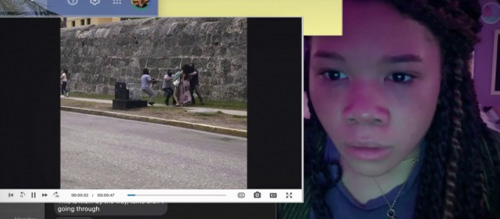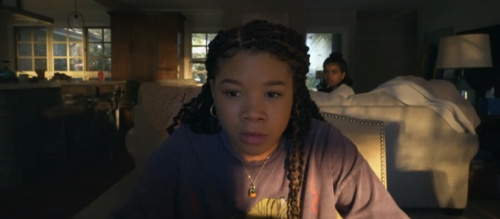Missing (2023) Review

Missing (2023)
Directors: Nicholas D. Johnson, Will Merrick
Screenwriters: Sev Ohanian, Aneesh Chaganty, Nicholas D. Johnson, Will Merrick
Starring: Storm Reid, Joaquin de Almeida, Ken Leung, Amy Landecker, Daniel Henney, Nia Long, Megan Suri
When The Blair Witch Project popularised the concept of found-footage horror in the 1990s, it quickly commanded a space in the history of cinema by responding to the way society was changing around it. Home video recorders were more accessible than ever, and anyone who was around back then probably experienced a Disney VHS tape suddenly becoming footage of their grandad at Christmas. By taking something that people were doing en masse and making it spooky, in a way this new form rejuvenated the horror genre. In 2014, Unfriended tried to do the same with a new idea. Casually referred to as “screenlife”, this style is entirely framed within the confines of a computer’s desktop or a phone’s screen in the way that a lot of people’s lives have become. Unfriended didn’t have anywhere near the same impact as a new medium, but now Missing is here to give it another try in a thriller setting.
Missing isn’t entirely new in this context. Screenwriters Sev Ohanian and Aneesh Chaganty were also behind Searching, another screenlife film to which Missing serves as an adjacent follow-up. The central ideas and messages are very much shared between the two: that technology holds the key to all of life’s mysteries if we disappear down a sufficiently deep and relevant rabbit hole. Where Missing has its own place is that the world has moved on a lot since Searching, and the “sharing economy” (of which apps like Uber and Task Rabbit are a part) has made connecting with people for small jobs much easier. If nothing else, this is the film that provides quite a convincing case in favour of most of the little bits of technology that our lives are now littered with.
The set-up works quite well. We meet June who lives at home with her mother, Grace, and her mother’s new boyfriend, Kevin. Her friend, Veena, is waiting on a Venmo payment so she can go and buy the drinks for the party they’ve presumably planned together for when Grace and Kevin leave the country for a holiday in Colombia. Being the caring mother she is, Grace leaves June $350 in case of any emergencies, but $120 of that goes straight to Veena. At the resulting party, the screenlife style is quite novel. Empathy for the characters comes quite easily because we’re seeing what comes across as very personal snippets of their lives in a way that we’re used to seeing from our own friends and families.
When she gets a reminder to clean the house before her mother and Kevin get home, June plans a little prank in which she drives to the airport to pick them up with a funny sign. This is just an excuse to sustain the style of the film by creating a situation that she might post on social media, and there are lots of little bits like this where style comes before substance in a light-hearted but forgivable way. Unfortunately, this does eventually become distracting.
For the most part, it works as an interesting concept. June’s desktop is messy in such a way that we’re able to quickly learn about parts of her character and the relationships in her life without anything having to be said. And once the thriller element starts to kick in, seeing June’s thought process play out in real time as she’s stood up at the airport with no clue as to where her mother and Kevin could be is certainly intriguing. But the style becomes problematic when given any thought; it would be impossible to relate to her as a character without being able to see her, and Missing is a bit too aware of that.
In order to shoehorn a shot of June into every scene, she is depicted as doing odd things like leaving her camera app open for seemingly no reason. It makes it difficult to become truly immersed in the narrative because it’s such bizarre behaviour. In all fairness to Missing, it’s a problem with the screenlife form rather than anything that the film itself is overtly guilty of, but it perhaps goes to show why the style never took off.

Aesthetics aside, Missing tells a story of so many twists and turns that, inevitably, it all becomes a bit too contrived. June uses various apps and tricks to hunt down her mother and Kevin, and it’s clear that a lot of thought has gone into this part of the narrative. But there are also moments where, in order for June’s investigation to bear any fruit, things have to happen in a certain way that either has us questioning why characters would ever act how they do, or how they’d even be able to do what they’re doing. Conveniently, characters who work with technology forget how it works, the police have no sense of confidentiality, and June somehow manages to type in a language that she can’t speak for the sake of a Google translate scene.
There are a few subplots that centre around parent-child relationships. One, obviously between Grace and June, another between Javi (a Colombian whom June hires through a Task Rabbit equivalent to help with her investigations locally) and his son, and another beyond those. That’s where the emotions of the story really exist, and it’s a shame that more of the runtime is dedicated to what is essentially an elaborate demonstration of the benefits of modern technology as opposed to these more relatable strands.
Missing does have some clever pay-offs, and they do contribute to the film feeling like a mystery thriller for the modern day by using so many aspects of modern living, but the way that we get to them is so messy that it becomes impossible to truly appreciate how well-crafted some of it is. There are multiple references to the true crime genre that Netflix seems to have recently monopolised, and if this was a true crime story then it would certainly be an intriguing one. The difference, though, would be that any true crime doc wouldn’t have to rely on such strange behaviour to satisfy its visual style or move the plot along.
Missing is a film that peaks early. While the narrative is at its simplest at the very beginning, it is a sweet little film that uses the screenlife format to its advantage. When it becomes more complex and begins to outgrow its format, Missing also outgrows the promise that it had begun to show.
Score: 11/24
Recommended for you: The Art of the Social Media Thriller; Narcissism, Paranoia and Tools for Good or Ill
Written by Rob Jones
You can support Rob Jones on his website: rbrtjones.com
Twitter: @rbrtjones

